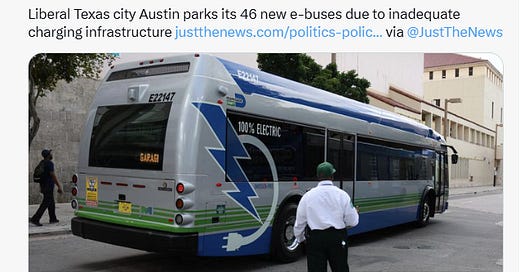Kevin Killough, the terrific, real energy journalist at JustTheNews, reported Tuesday on the continuing electric bus fiasco in the oh, so, woke Texas city of Austin.
Here’s an excerpt from that story at JustTheNews.com:
Austin, Texas, planned to transition all its city buses to electric, but the ambitious climate-friendly goal has come to a screeching ha…
Keep reading with a 7-day free trial
Subscribe to Energy Transition Absurdities to keep reading this post and get 7 days of free access to the full post archives.




